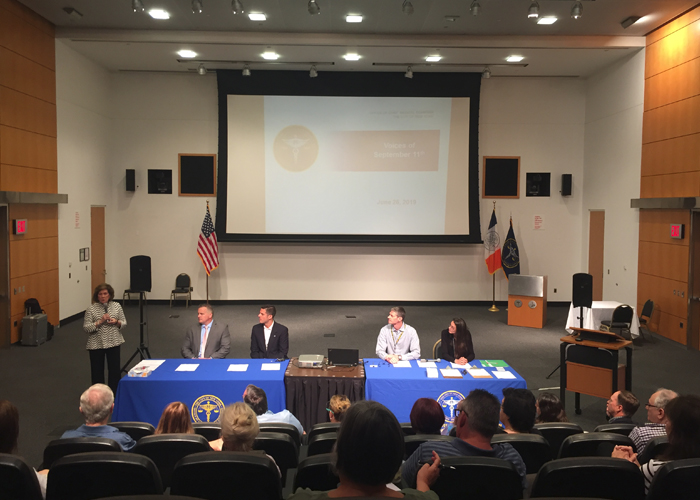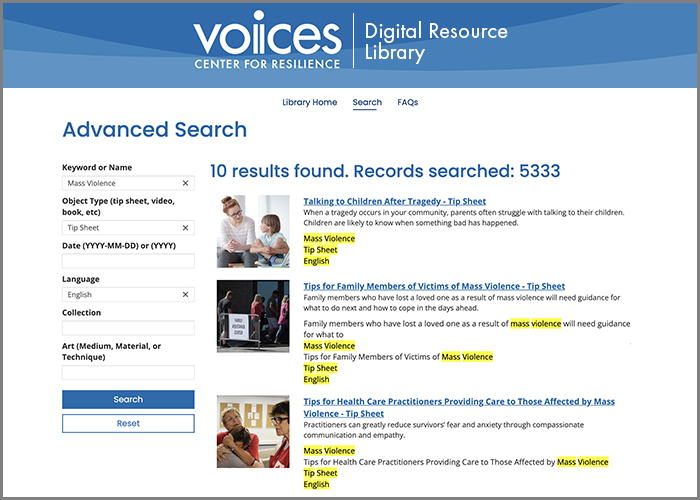Education
VOICES collaborates with like-minded individuals and organizations with expertise in mental health care, emergency management, law enforcement, counterterrorism and victim services. Our September NYC Symposium brings together subject matter experts from the U.S. and abroad to share lessons learned.
Programs
VOICES has established multi-faceted programs that provide support and promote healing, including discussion groups, webinars and peer-to-peer support.
Our groups provide an opportunity for families, survivors and responders to connect with each other and discuss their shared experiences. VOICES Webinars provide guidance from subject matter experts and an open discussion to ask questions. VOICES Support Groups are facilitated by clinicians, who provide psycho-educational information and a venue for peer-to-peer support.
VOICES offers expert-led webinars and interactive workshops that build coping skills and resilience to meet the evolving needs of trauma survivors and communities.
VOICES has hosted 30 conferences and symposiums with researchers, clinicians, and advocates sharing insights on trauma, grief, and long-term mental health recovery.
VOICES Tip Sheets provide clear, timely guidance to help individuals and families manage anxiety, locate support, and take steps toward healing after traumatic events.
VOICES helps communities prepare for the long-term impact of mass violence by creating programs that support victims’ emotional recovery long after the initial crisis.
Resource Directory
VOICES vast and growing collection of evidence-informed resources, knowledge to practice trainings, best practices, VOICES Resource Kits, Tip Sheets, publications, research, and a comprehensive and expanding victims support resources directory.
Accessible to scholars, mental health, and victim support service providers, including corporations, government agencies, organizations, nonprofits, and individuals. Through consultation services and a network of national and international partners, VOICES lends expertise and lessons learned to individuals, communities, organizations, and professionals to promote resilience, preparedness and response, and long-term recovery from traumatic events.
After trauma, it’s normal to feel sadness, fear, or anxiety. If symptoms persist for weeks, seeking help from a mental health professional is important.
Resilience means adapting to adversity. It includes beliefs, skills, and support—qualities individuals and communities can strengthen to recover from life-altering events.
After tragedy, government and nonprofit agencies offer vital services. Some respond immediately, while others assist long-term when communities need extra support.
Crisis lines offer 24/7 support when people feel overwhelmed or alone. These services provide immediate help when other mental health resources aren’t available.
VOICES Digital Resource Library
In memory of the late Kurt Wolfgruber, who served as VOICES Board Chairman for over a decade, VOICES Digital Resource Library furthers VOICES mission and vision to promote healing and build resilience as it advances mental health care and resiliency studies.
Kurt’s legacy of compassion and commitment to helping individuals impacted by tragedy remains an inspiration and informs the strategic direction of the important work of the Digital Library. The work of the Library is focused on three primary areas: the Digital Research Library, research initiatives and our national and international partnerships.
The Digital Resource Library supports VOICES mission to build resilience by sharing research, resources, and expertise in mental health and emergency response fields.
The Library is a vital tool for scholars, mental health providers, law enforcement, nonprofits, and others seeking credible information and expert-informed resources.
VOICES shares research and guidance from its global network, offering insights on trauma, recovery, and resilience developed since the aftermath of September 11, 2001.





 Mental Health & Wellness
Mental Health & Wellness Building Resilience
Building Resilience Organizations & Agencies
Organizations & Agencies Hotlines & Help Lines
Hotlines & Help Lines

